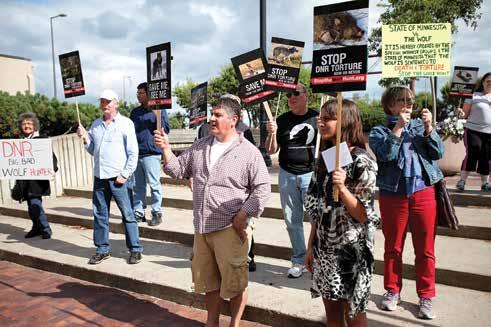
3 minute read
Speaking for the wolves Passion
By Kayla Felien
For Nature Spurs Wolf Advocacy
Dr.Maureen Hackett has seen her childhood love of nature grow into activism as founder of Howling for Wolves, a group dedicated to protecting the species in Minnesota’s wild.
As a girl growing up in the suburbs of southern Minnesota, she enjoyed looking for frogs and being outside. Her love of nature expanded during a dog sled expedition in the Boundary Waters Canoe Area Wilderness, where she felt a personal connection to wolves and their environment.
“We followed wolf tracks and heard wolf howls” Hackett said of her time up north.
Being in the wild had the feel of a Jack London novel. To see tracks and hear wolves running as a family pack in their natural habitat captivated her imagination and touched her heart, she said.
“It was a small group and expedition style, meaning we set up at a new site every day and travelled pretty far into the Boundary Waters and parts of Canada,” she said. “Heavy snow in in forensics. In 2003, she successfully lobbied at the Minnesota legislature for a law prohibiting the use of tobacco products on Minnesota hospital properties. In subsequent years, she put her passion for animals and her experiences with politics to work.

The Minnesota legislature decided in 2011 to allow the Minnesota DNR to commence planning for a wolf hunting season. Recreational wolf trophy hunting would be allowed after removal from the Endangered Species List in January 2012. By early 2012, the DNR had begun discussing holding a hunting season with regulations and licenses. That year, Hackett founded Howling for Wolves in response to the changes. As of December 2014, wolves living in Minnesota were still considered a threatened species.
“The wolf was not represented,” said Hackett of the proposed hunt season. “I didn’t intend on getting in a federal fight.”
March, 41 dogs and six people.”
Since then, Hackett has become a physician and professor, specializing in psychiatry and with an added focus
Hackett felt strongly about giving a voice to the wolves, especially since a hunt was being scheduled soon after the delisting. Some advocates had hoped for a five-year deferment of the hunt to see how packs would fare. They also wanted more accurate counts of the population, and to establish rules and regulations for an eventual hunt. They saw a need to study the wolf population and to educate people about the environmental and economic benefits of having a strong wolf population.
Hackett’s colleague, Leslie Rosendahl, called her the driving force behind Howling for Wolves.
“The organization has been particularly successful and influential because of her ‘never give up’ attitude,” Rosendahl said.
For the past four years, Rosendahl has worked with Hackett and Howling for Wolves, assisting with communications. “This large organization is special because of the passion of its leader and many advocates,” she said. “We feel so strongly in support of the wolf and wildlife and want to help speak for them.”
Gray wolves used to live across the United States, but in the late 19th and early 20th centuries, they were hunted out of the lower 48 states except for Minnesota, according to the howlingforwolves.org. As wolves are killed, there is a devastating disruption of the pack’s social structure, Hackett said. With only one litter per pack, any death takes a toll. For example, when an adult wolf is killed, younger wolves may not have learned all the necessary skills to survive.
Wolves have been known to kill farm animals, but the numbers are low. In 2017, 76 livestock animals were killed by wolves, according to information from the U.S. Department of Agriculture.
“Wolves are an incredible part of our ecology and culture in Minnesota, and it’s also key to recognize how unique and important they are. Wolves, which have come back from near extinction (but are still on the Endangered Species List so they can recover), live in packs and are very social, just like humans,” Rosendahl said. “For these reasons, it’s against common sense to trophy hunt the wolf, which is why I became involved with Howling For Wolves.”
Howling for Wolves’ intention is to advocate, educate on the need for protection, and engage people in discussion and action. Group members oppose the recreational hunting and trapping of wolves and snaring of all wildlife. Numerous volunteers and donors have stepped up to lend their voices and talents.
Volunteers write letters, connect with lawmakers, give talks at schools, participate in peaceful demonstrations and host educational booths at both county and state fairs. Every year since 2014, volunteers attend wolf day at the capitol. Advocates are working to sway public opinion to agreeing that killing wolves should be a last resort, using instead nonlethal prevention measures.
“If you want to have an impact, figure out where you can have an effect on the decision-making,” Hackett said. “Get involved politically. Be aware of the system and how it works.”
“Don’t give up on the system yet,” she added. “Get the right candidates in.” Visit howlingforwolves.org for more information. D child, Kindergarten-8thgrade.Students applyingfor kindergartenmustbefive years oldbySeptember 1, 2018,and Minnesotaresidents. To apply,visit www.duluthedison.org







